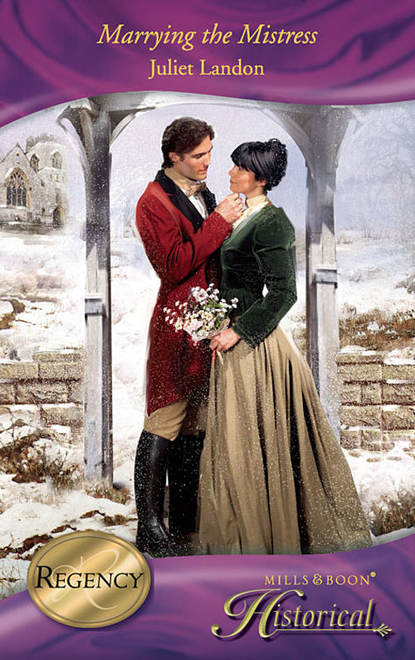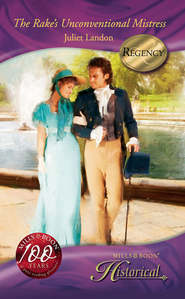По всем вопросам обращайтесь на: info@litportal.ru
(©) 2003-2024.
✖
Marrying the Mistress
Настройки чтения
Размер шрифта
Высота строк
Поля
It was where all my household believed my family to be living, about forty miles away on the coast. Foss Beck was less than half that distance, and the only person ever to accompany us there was Jamie’s formidable nurse, Mrs Goode, who would not have disclosed the smallest detail of my secret. She had once been a man’s mistress, too. ‘As soon as the snow begins to melt,’ I promised, ‘we shall go. What shall we take her?’
‘Eggs. She likes duck eggs, Mama.’
That would be like taking coals to Newcastle. They had hens, ducks and geese roaming freely, and no shortage of eggs. But bread would be a problem.
‘Tell me when you’re going and I’ll make you some of my meat pies,’ said Mrs Neape, hoisting the side of lamb on to her padded shoulder. She would not, however, see any need to send loaves of bread.
With little improvement in the weather, the reading of Linas’s will was delayed for almost three weeks and, even then, several of the family were missing, so Mr Brierley told me, owing to the impassable roads. It was he who called to say that he hoped I would not mind hearing at second hand what concerned me, since that was how several of the others would receive news of their endowments too.
What they were endowed with I have no idea, never having shown much interest in what Linas owned, or whether he relied on his wealthy father for an allowance, as many sons did. Even when they were twins, second sons rarely prospered as well as their elder siblings in the property stakes, although I had no doubt that Linas would never have been left wanting. As his mistress, I was probably the most expensive of his few extravagances, albeit not as costly as some I’ve heard of. I had, after all, reorganised my own business after Jamie’s birth, and thank heaven for my foresight, Mr Brierley having no outstandingly good news to offer me that day.
At first, I could hardly believe what I was hearing.
That Linas wanted me to continue living on Blake Street came as a great relief, though no real surprise. Mr Brierley’s assurance was quite clear that the house would be made available to me for as long as I wanted it. But when he kept his balding head bent while unnecessarily sorting papers out across the polished table, I guessed that he was seeking not figures, but a kind way to break the news. It came very quietly and deliberately.
‘As for pecuniary endowments, Miss Follet,’ he said, glancing up at last, ‘that’s money, you understand…’
‘Yes?’
‘Mr Monkton has left you the sum of three hundred and fifty pounds per annum for the rest of your life.’
‘Yes?’
‘Er…yes. That’s all.’
I stared at him, frowning, puzzled. ‘All? Three hundred and fifty?’
His finger pointed at the yellow page. ‘Yes. That was his wish.’
‘But how am I supposed to manage on that? Has he left no provision for our son?’
‘Certainly. Master James Frederick Linas Monkton has been left, you will be pleased to hear, a substantial trust fund, to remain in the hands and to be administered by his sole guardian, Lord Burl Winterson of Abbots—’
‘Yes, I know where Winterson lives, but what else is there? Surely Linas left me something for Jamie’s needs until he comes of age? I cannot raise him on three hundred and fifty pounds a year, Mr Brierley.’
‘You are not supposed to, Miss Follet, if I may say so. The trust fund to be held by Lord Winterson is designed to cater for all your son’s needs, as and when he needs them. This will include all his living expenses, his clothes and education and so on. All you will have to do is to apply to James’s guardian for—’
‘But that’s ridiculous!’ I yelped, jumping to my feet. ‘Are you saying I shall have to request money for Jamie’s food, but not for mine, candles and coal for Jamie, but not for me, his nurse’s wages, a groom…’
‘No…no, Miss Follet.’ Mr Brierley smiled, waving a hand in my direction. ‘I don’t suppose it will come to that, will it? I’m sure Lord Winterson will see that you have what you need for young James. A kind of allowance? Monthly? Weekly? But Mr Monkton’s wishes are quite clear that his brother shall have every say in his ward’s upbringing, and I have Lord Winterson’s assurance that he intends to exercise his guardianship with the authority of a father. It must surely be comforting for you to know that your son will have a guardian who is so committed to his immediate welfare.’
I stood by the window, stunned by the chilling austerity of Linas’s tight-fistedness. I felt I deserved better than that, after almost six years of devotion. I wished then that my life had taken a different turning. Gripping the rose-velvet curtain, I spoke my thoughts out loud. ‘The house will have to be sold,’ I said. ‘And I shall have to find a husband. Yes, that would be best for both Jamie and me. Even with a house to live in, it’s going to take every last penny I can earn to keep it going.’
‘Ahem!’ Mr Brierley coughed, shuffling the papers again. ‘I believe Mr Monkton did add a clause concerning that eventuality, Miss Follet, if I can find it somewhere. Ah…yes, here we are.’ He adjusted his spectacles. ‘Should Miss Helene Follet decide in the future to take a husband, then my son James Frederick Linas Monkton shall live permanently and exclusively in the home of his guardian at Abbots Mere in the county of York. There. He’s saying that—’
‘Yes, thank you. I believe I know what he’s saying, Mr Brierley. In short, I shall lose Jamie if I marry.’
‘Correct. You will also lose the use of the house too, I’m afraid.’
‘What?’
He nodded, pursing his lips. ‘Mmm. Well, you can see his point.’
My head reeled as I sat down with a thump upon the couch. Oh yes, I could see his point quite clearly. No wonder he’d been loath to discuss it with me. Not only had he decided by whom and when I should bear a child for him, but now he was asserting that he could take it away again if I did not conform to his wishes. How dictatorial was that? As for Winterson exercising his guardianship like a father, well, yes, he would. Exactly like a father.
‘That is most unfair, Mr Brierley, and highly unethical. That is interfering with my right to take a husband and to keep my child.’
‘Surely, Miss Follet, it is better for your son to have a guardian he knows and likes than to have a stepfather he doesn’t know? I do believe Mr Monkton had this in mind when he made this wish.’
Did he? I struggled to think what Linas had in mind when he saw fit to interfere in my life even after he’d gone. Jamie was precious to him too, I understood that, but he could not realistically expect me to see eye to eye with his brother on any matter relating to Jamie’s upbringing, when Winterson had no experience whatever of children. I felt insulted that he could not have left matters in my hands and made funds available to me for Jamie’s use. Did he think that, although I could manage a business, nurse him day and night, run my own household and care for a three-year-old, I could not be relied on to handle a trust fund? No, probably not. There had been times when I wondered whether Linas spared much thought for me at all. Now I knew the answer.
‘This will have to be contested,’ I muttered. ‘It won’t work.’
‘Miss Follet,’ said Mr Brierley, removing his spectacles and sitting back in his chair, ‘one cannot contest a will simply on the basis that one thinks it might be difficult to put it into practice. There is nothing here that is unworkable. You may have found it disappointing, but the terms are not so very unusual. Mr Monkton’s reasoning was sound at the time, and he does not state that you should not marry, only that his son shall live with his guardian if you do.’
‘And you see nothing sinister in that, sir? Is it remotely likely that I would allow that to happen, do you think?’
‘Ahem! I really cannot comment on that, Miss Follet, except to say that Mr Monkton’s prime concern was for his son’s well-being.’
‘Which I find difficult to understand, sir. One would have thought that his son’s well-being would be all the better for knowing that his mama was happy too. Oh, yes,’ I said as he opened his mouth to speak, ‘I know that wealth is not happiness, but how am I supposed to pay the servants’ wages, keep the place warm and in good repair, and maintain the standard of living that Jamie is used to, I wonder, on three hundred and fifty pounds a year? Not to mention my own requirements. I shall be obliged to look for a little cottage to rent. That seems to be the only solution. Thank you for coming, Mr Brierley,’ I said, holding out my hand. ‘I think the best I can do now is to speak to Lord Winterson personally and see if we can come to a more sensible arrangement. Even he must realise what an impossible position this puts me in. Good day to you, sir.’
He shook my hand and gathered his papers together. ‘Mr Monkton’s servants will be gone from Stonegate by Friday,’ he said. ‘All of them except the top four have been paid and found new positions. The house will then be locked, prior to the new administration of the estate. If there is anything in the house that belongs to you, Miss Follet, I wonder if you would mind letting me have a list of the items so that I can isolate them. Oh… er…one more thing. If I may have your key to the Stonegate property?’
I took it from the drawer of my writing table and gave it to him. There were several things at Stonegate that belonged to me: a pair of miniature cameo portraits, my silver pill box that Linas used once, the embroidery workbox I kept there and a set of ivory combs, brushes and manicure tools. They were private, and I’d be damned if I’d make a list for him to hum and haw over.
It occurred to me much later that night as I lay sleepless, that Mr Brierley had not brought with him the title deeds to my house, or things to sign that would establish me as the new owner. Well, I must remember to mention it next time we met.
Chapter Three
Had I misunderstood? Had I not listened to him with enough attention? Had he really said the house would be mine? Mr Brierley had made no response to my angry comment that I would have to sell it and find a small cottage with fewer servants. Reduced circumstances I was familiar with, the fortunes of women in my position being notoriously unstable, but was that really what Linas had wanted for me and Jamie? I found it hard to believe.
My house on Blake Street was newer and more fashionable than our old family home had been, furnished with woods that shone like satin, hung with soft tones in velvet and silk, carpeted with Axminsters and matching Persian rugs, my bedroom patterned with birds and trees. My canopied bed was carved by George Reynoldson of York, no less. I had a family of loyal servants who gave me no trouble at all, and Linas had paid their wages without me ever having to worry about the cost. I kept a phaeton and two horses in his stable at Stonegate with no clear idea of whether they would still be mine to use. I ought to have asked Brierley at the interview, but perhaps he had given me enough bad news for one day.
My first call on the following day was to Follet and Sanders. Leaving Jamie at home with Goody, his nurse, I trudged over new layers of frozen snow. Every rooftop and ledge was capped with rounded pillows of white, blown like lace into every crevice and beyond where the great white minster reared its spiked towers, draped like a bride, silent and virginal.
The workroom door let in a fall of snow as I entered. Shivering in the chilled hallway, I met Prue with chattering teeth. ‘It’s as cold in here as it is outside,’ I complained. ‘We’ll never attract any customers at this rate.’
Unmoved, she kissed me daintily on both cheeks, casting her eye over my black outfit with the grey squirrel fur up to my ears. For all her fair, petite, middle-aged looks and elfin ways, she was as tough and sensible a businesswoman as any in York, with the typically dour sense of humour that can poke fun at what is difficult to accept. ‘No, dear,’ she said, without a hint of levity, ‘but we’re selling fur muffs and knitted gloves like hot cakes, so we can’t have our customers getting overheated, can we?’
‘And fur-lined capes? Those fur hats, too?’
‘Fur-edged handkerchiefs,’ she replied, deadpan.
‘No!’
‘No,’ she agreed. ‘Come and see.’
‘It’s not warm enough in here either,’ I said, entering the large workroom where women sat at the oak table, each with a mound of fabric before her, reels of cotton on revolving stands, pincushions and tapes, scissors, lamps and lace edgings. They looked up and smiled, all of them swaddled in woollen shawls and fingerless mittens. The windows were white, patterned with ferns.











